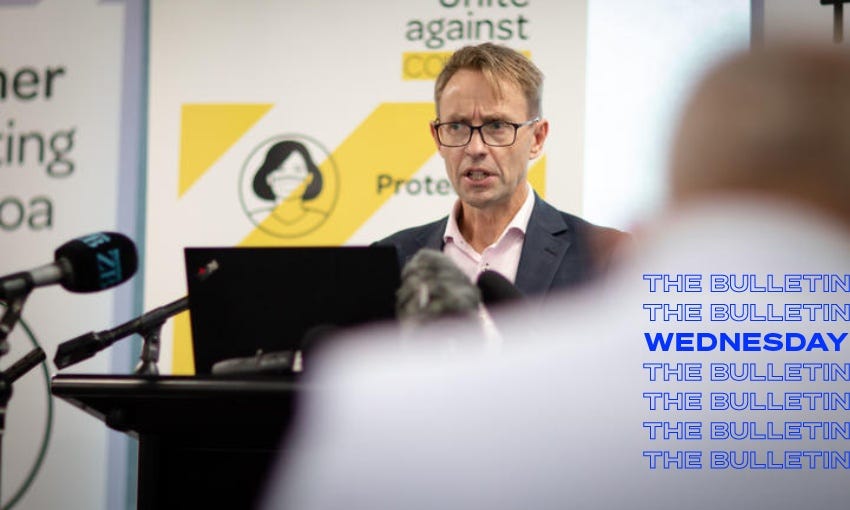An apology from Ashley Bloomfield
The country's testing system failed last week and tens of thousands of tests haven’t been processed yet
Mōrena and welcome to The Bulletin for Wednesday, March 2, by Justin Giovannetti. Presented in partnership with Z Energy.
In today’s edition: Parliament united in condemnation of Russia; the peace centre rocked by conflict; there’s still time to act on climate change; but first, how the testing system failed to meet expectations.
Ashley Bloomfield apologised yesterday for an early failure of the country’s testing system. (Image: RNZ / Angus Dreaver)
How the PCR testing system failed. Director-general of health Ashley Bloomfield took the rare step yesterday of apologising to the 32,000 New Zealanders who have been waiting five days or more for test results. He confirmed what most people had already figured out, the country’s testing system didn’t have the laboratory capacity officials had promised. As One News reports, 9,000 delayed tests were freighted to Queensland over the weekend to help clear the backlog. The prime minister told reporters after Bloomfield’s apology that she became aware of the lagging lab capacity last week and raised concerns with the director-general about whether tests were being processed in a timely way. She admitted “errors have been made”, but took no responsibility.
What went wrong with testing? The situation was very different in late January when an upbeat Ayesha Verrall promised that “New Zealand is well prepared for omicron”. The associate health minister said the country’s labs had a baseline ability to deal with 58,000 PCR tests daily and could surge to 77,600 daily tests for a week. Instead, the wheels started coming off at around 30,000 tests a day, according to The Spinoff’s live updates. One of the main issues has been previously reported in this newsletter, that once omicron got into the community, the number of positive tests soared. That meant pooled testing had to be abandoned and each sample handled separately, slowing testing. Other issues had not been previously disclosed, including a shortage of reagents used in testing, delays installing new lab equipment and staff shortages due to vacancies and infections. The result was a move to widespread rapid testing sooner than otherwise expected.
Of yesterday's nearly 20,000 daily cases, only 2,513 were detected by PCR. Within a few days New Zealand has become a RAT nation, with 87% of yesterday’s cases detected by take-home rapid tests. The government’s shift to phase three of the omicron plan was accompanied by an appeal to personal responsibility and New Zealanders have continued to play their part, getting tested and uploading their results in huge numbers. The team of six million is still going strong. However, people waiting on tests from last week should know that they’ll likely be less sensitive because of the daily. According to Stuff, a positive result will still be a confirmation of a case, but a negative result might be suspect.
Questions linger about why the testing ‘overestimation’ wasn’t announced sooner. Newsroom’s Sam Sachdeva wrote on Twitter that the ministry of health hadn’t answered questions he put forward last week about why testing capacity was being quietly revised down, only for Bloomfield to announce it yesterday. As a reporter, that’s a frustrating outcome and poor transparency from officials. With the surge in cases and growing difficulty getting information out of the government, daily 1pm press conferences have now returned. As RNZ reports, the opposition now also wants to know why the public wasn’t told sooner. This is an area where questions in parliament and from pesky reporters have made the public health response better. Thanks for asking Sam.
The Spinoff’s Covid data tracker has the latest figures.
A quick word. With omicron cases increasing and tensions running high, there has never been a greater need for trustworthy and freely accessible journalism. The generous support of our members powers all of The Spinoff's Covid-19 coverage, from live updates to the award-winning mahi of Toby Morris and Siouxsie Wiles. Tautoko mai, join The Spinoff Members today.
Underway now: Police moving on protest camp outside parliament. Police say a large number of officers are part of an operation this morning to “restore access within the protest area on parliament grounds.” Overnight, protest leaders said they’d received intelligence that their encampment was going to be cleared and asked women and children to remain on site to stall any advance. It’s likely police told them to leave. RNZ is blogging the latest developments.
Slava Ukraini. The prime minister led a parliament united in condemnation of Russia’s invasion of Ukraine by proclaiming the Ukrainian battle cry in the house. As Stuff reports, the country’s political leaders have stood up for democracy and against an unprovoked war in eastern Europe. The only point of contention is a demand from the opposition for the government to do more, starting with an independent sanctions regime that could be used against Russia. Jacinda Ardern said one could be adopted “quite soon”. Without direction from the Beehive, hundreds of KiwiSaver funds are pulling their investments out of Russia, One News reports. According to RNZ, National is also urging the government to provide hundreds, possibly thousands of visas, for Ukrainians fleeing Russian tanks.
Meanwhile in Europe, Nato has upped the ante. Vladimir Putin made a vague threat over the weekend to use Russia’s nuclear arsenal in response to military and economic setbacks from his invasion. The threat is widely perceived by defence experts as a bluff. Nato has now confirmed, according to Reuters, that a serious cyberattack on one of its members by Russia could trigger the collective defence clause, pulling the entire alliance into war. Russian cyberattacks are widely expected in response to economic sanctions.
Parliament looks different this week with a new hybrid session. Questions are being asked and answered virtually for the first time as most of parliament isn’t in Wellington, but spread through the country. The omicron outbreak was behind a vast rewriting of the rules. The House explains how the hybrid chamber came about and how lawmaking is being done by Zoom. It’s only a matter of time until an MP forgets to take off mute, wears something outlandish or doesn’t wear anything at all.
Dame Valerie Adams retires from athletics. “I’m officially hanging up these size 14 throwing shoes,” Adams said through tears as she ended a legendary Olympics career that includes four medals, half of them gold. One News lists the accomplishments and awards that go with a two decade career in international sport.
Peace and conflict centre is riven by war. The Otago Daily Times reports that the University of Otago’s Centre for Peace and Conflict Studies is known on campus as the “conflict and conflict centre”. A report leaked to the newspaper unveils deep dysfunction and a toxic culture, with allegations of sexism, racism and favouritism. The report concluded that the centre thought it was overworked and special, but it was just deeply out of touch, underworked and running growing deficits. The university and outgoing director declined to comment, but said all the report’s recommendations were adopted.
The dither-and-panic approach to climate change can still be avoided. Eloise Gibson looks at yesterday’s climate report for Stuff and concludes there’s still time to act. Cities and farms can still be saved, as long as governments get to the business of preparing now. Mirjam Guesgen points out in The Spinoff that it isn’t just where you are, but who you are that’s important. Climate impacts are going to be concentrated among the economically and socially marginalised. In many cases, that means among indigenous people. Working with them recognises that.
Got some feedback about The Bulletin, or anything in the news?
Get in touch with me at thebulletin@thespinoff.co.nz
Right now on The Spinoff: Emily Writes explains what to do if your child tests positive for Covid. Madeleine Chapman looks at a recent Newsroom “investigation” of the misinformation group Voices for Freedom. Jihee Junn (partnership) writes about how to plan for pandemic-era travel. Chris Schulz speaks with a Wellington flatter whose nightmare comes true. Catherine Woulfe & Chris Tse consider the surprises in the list of 2022 Ockham finalists.
A New Zealander is now the world’s top ranked male squash player. Paul Coll is the first New Zealand man to sit at the pinnacle of squash, RNZ reports. A number of New Zealand women have had the same honour in the past. Coll said that “dreams come true” after he reached the top spot and plans to try to play in New Zealand later this year, after three years away.






